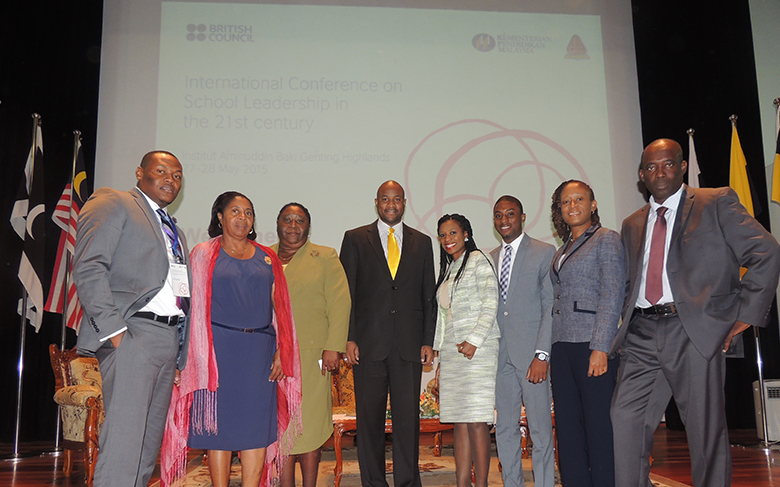How countries prepare their teachers to engage the 21st Century learner is again being brought into sharp focus by educators, many of whom gathered in Malaysia last week for the International Conference on School Leadership in the 21st Century.
Describing the new learners as members of ‘Generation Y’, presenters from several countries including Taiwan, the United Kingdom and Ghana,highlighted the impact of new communication technologies on student learning and emphasised the need for school leaders and education ministries to ensure that their teachers are not left behind.
Senior Research Fellow at the University of Malaya, Malaysia Professor Hussein Ahmad made reference to the fact that students are turning up at school with much more knowledge, primarily because of their access to the World Wide Web.
According to him, the impact of technology has been pervasive. “Everything is online, so if your mind is under the line, you will be left behind,” said Ahmad, a former Ambassador to UNESCO.
Deputy Chief Education Officer in Charge of Curriculum and Support Services at the Ministry of Education in Jamaica, Mrs Lena Buckle Scott,who is among eight Ministry of Education representatives at the conference in Malaysia, is acknowledging the concerns but asserts that Jamaica,through several initiatives has been moving to address the issue. “One such initiative is the draft National Standards Curriculum, which fully embraces Ambassador Ahmad’s sentiments. The new curriculum is replete with 21st Century teaching methodologies/strategies, namely the use of:ICT, Science Technology, Engineering, Arts (Performing and Visual) and Mathematics (STEAM), Webb’s Depth of Knowledge to articulate learning objectives and develop competencies along with the Five “E” model of lesson delivery to have students engage, explore, explain, expand and evaluate as they make connections and derive meanings in a learner centred environment,” she explained.
Meanwhile, Institutional Monitoring Officer at the Jamaica Tertiary Education Commission, Mrs Novlet Plunkett says that entity has been discussing the matter with country’s teacher training institutions. “Preparing students for the 21st century economy requires teachers to be equipped to utilize 21st century pedagogies.
According to him, the impact of technology has been pervasive. “Everything is online, so if your mind is under the line, you will be left behind,” said Ahmad, a former Ambassador to UNESCO.
Deputy Chief Education Officer in Charge of Curriculum and Support Services at the Ministry of Education in Jamaica, Mrs Lena Buckle Scott,who is among eight Ministry of Education representatives at the conference in Malaysia, is acknowledging the concerns but asserts that Jamaica,through several initiatives has been moving to address the issue. “One such initiative is the draft National Standards Curriculum, which fully embraces Ambassador Ahmad’s sentiments. The new curriculum is replete with 21st Century teaching methodologies/strategies, namely the use of:ICT, Science Technology, Engineering, Arts (Performing and Visual) and Mathematics (STEAM), Webb’s Depth of Knowledge to articulate learning objectives and develop competencies along with the Five “E” model of lesson delivery to have students engage, explore, explain, expand and evaluate as they make connections and derive meanings in a learner centred environment,” she explained.
Meanwhile, Institutional Monitoring Officer at the Jamaica Tertiary Education Commission, Mrs Novlet Plunkett says that entity has been discussing the matter with country’s teacher training institutions. “Preparing students for the 21st century economy requires teachers to be equipped to utilize 21st century pedagogies.
These must be modelled by teacher educators and student teachers should get enough time in the field to practise these skills with relevant feedback.The discussions with teacher training institutions surround the type of programme changes which need to be made to facilitate this”, Mrs Plunket explained. She added that a re-design of teacher education programmes to deliberately integrate 21st century skills such as collaboration, critical thinking, communication and creativity may be vital at this point.
Principal of St Hugh’s High School Mrs Elaine Cunningham and Mr Damion Spencer, Principal of Inverness Primary and Infant School in St Ann, who also attended the two day conference, echoed the importance of teacher-professional development initiatives addressing the emergent needs of in-service teachers.
Commenting on the overall value of the conference, which involved more than 300 educators from 22 countries, the local educators acknowledged that the discussions at the event have led them to develop a greater level of appreciation for the programmes being introduced in Jamaica. “You know, we tend to bash ourselves a lot, but when you examine closely advances on the global scene, you realize that Jamaica is on the right track. For example, the new curriculum that we are piloting is something that several other countries are either developing or implementing,” Mrs Buckle Scott explained.
The delegation is being led by Principal Director of the National College for Educational Leadership, Dr Maurice Smith. Jamaica’s participation has been facilitated by the British Council and Institut Aminuddin Baki, Malaysia and funded through a grant from the World Bank.

Jamaican Educators at the International Conference on School Leadership.
Mr Damion Spencer, Principal Inverness Primary School(left), Mrs Lena Buckle Scott, Deputy Chief Education Officer, Mrs Elaine Cunningham, Principal St Hughs High, Dr Maurice Smith, Principal Director, NCEL, Dr Taneisha Ingleton, Programmes Director, NCEL, Mr Philando Neil, Logistics and Certification Manager, NCEL, Mrs Novlet Plunkett, Institutional Monitoring Officer, JTEC and Mr Conrad Hamilton, Communication Specialist, ESTP.

